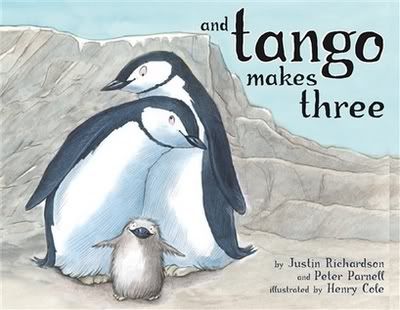And Tango Makes 420
 The American Library Association's activist campaign against anything outside its mainline secularist dogma continues again this year with the group's routine (yawn!) announcement of the year's "most challenged" books.
The American Library Association's activist campaign against anything outside its mainline secularist dogma continues again this year with the group's routine (yawn!) announcement of the year's "most challenged" books.To make the list, books must be the target of a formal, written complaint requesting it be removed from a library or school because of inappropriate content.
Topping the list again this year (says AP) is "And Tango Makes Three," a 2005 children's story about a family of penguins with two fathers.
"The complaints are that young children will believe that homosexuality is a lifestyle that is acceptable. The people complaining, of course, don't agree with that," Judith Krug, director of the ALA's Office for Intellectual Freedom, told The Associated Press on Tuesday.And what's wrong with that? It's a perfectly good concern, but not in ALA-think. Note Krug's job: "Intellectual Freedom." By issuing the list every year, Krug is absolutely opposing intellectual freedom because the list exists only to shame people who hold believes based on traditional morals and the values-based thinking that comes from a solid moral core.
How can I allege such a thing? Because in all the schools, in all the libraries across this great land, there was a grand total last year of 420 complaints against the content of books. Complaints are of such tiny consequence that Krug's nasty little compendium should yield absolutely no media interest, but since the media generally shares the ALA's view that we should all ascribe to secular relativism, they're happy to trumpet the results each year.
What's more, the number of complaints dropped dramatically, from a whopping 750 in the mid-90s to 546 in 2006, and down to last year's puny 420.
Other books on the ALA's top 10 list include Maya Angelou's memoir "I Know Why the Caged Bird Sings;" Mark Twain's "The Adventures of Huckleberry Finn," attacked by know-nothings because it supposedly is racist ... sheesh; and of course Philip Pullman's "The Golden Compass," an anti-Christian work that was slumbering away in obscurity until Hollywood decided to make a big Christmas-season film out of it.
Krug's explanation for the drop in complaints is strange and troubling:
"The atmosphere is a little better than it used to be. I think some of the pressure has been taken off of books by the Internet, because so much is happening on the Internet."I don't think she means the laissez faire morality of the Web has caused an erosion in morals which in turn brought a drop in complaints. More likely, she means people are spending more time on the Web and less in libraries.
And that may have more to do with the ALA's policies forbidding filters on computers and saying pedophiles have a right to look at kiddie porn on library computers, and librarians who think otherwise can be fired.
Labels: American Library Association, Morality, Secular Relativism




<< Home